The 'Yes You Can' project is about celebrating the diverse career journeys of our Black, Asian and Minority Ethnic (B.A.ME) staff, and the obstacles they have overcome to get where they are now as part of Black History Month 2023.
We asked B.A.ME staff in senior roles at NBT to share their career journeys, challenges and successes with us. Here's what they had to say:
Marcia's story
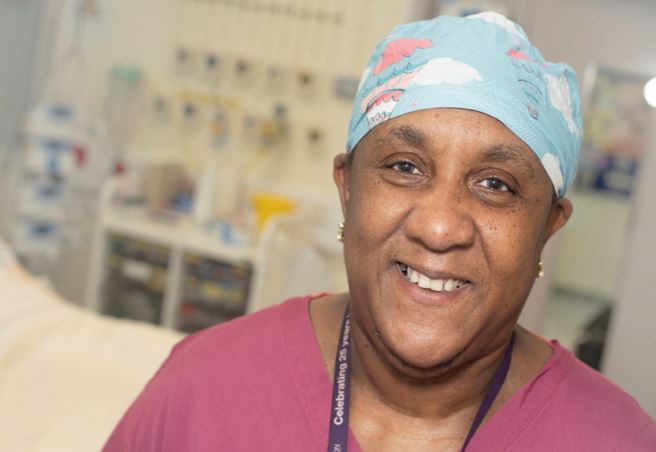
Marcia Dawkins is a Theatre Coordinator in our Anaesthesia, Surgery, Critical Care and Renal (ASCR )Division. Here, she shares her story of how she got into nursing and what it was like growing up Black in the UK:
Could you tell us about your career journey and educational background?
Education: Registered Nurse (Level 1), Registered Nurse (Level 2), Diploma in Healthcare Management, MSc Healthcare Management, NBT One leadership course.
I was born in Manchester. Both my parents are Jamaican. I consider myself to be a Black Caribbean (British), I am a Mancunian with a strong West Country accent. Most of my life has been in Bristol since I was 8 years of age. I am really proud of being a Black West Country Nurse who has and continues to make a difference in my workplace.
What made you choose the particular area you work in now?
To be honest, it was something that I was always interested in from the age of five
. But with the advice of my parents, I pursued other roles in society which just did not work out. I tried retail; I then tried hairdressing and I would always seem to get water all over my customers and they left soaking wet! It was clear to my parents that retail and hairdressing were just not for me. This did validate my calling into nursing, and it all started from there.
I started as an enrolled Nurse, Band 5 Nurse on a care of the elderly ward; Band 5 Nurse on a surgical ward (London) Band 5 on a medical ward, Weston Super Mare and 6 in Theatres (Bristol); Band 7 in theatres (RUH); Acting Theatre Manager Band 8 (RUH); Band 6 in Theatres (Bristol); Currently Band 7 in theatres (Bristol)
When I began my training in the 80s, we didn’t get the option to choose a specialty; you had to go where you were allocated. However, I did enjoy working with the elderly patients as they were good historians who loved to chat and share their life experiences, which taught me a lot.
What qualities are essential in your position?
Ability to listen, adaptability in approaching problems that need to be solved quickly, openness and transparency, being a strong voice for patients who are having any form of surgical intervention, having good people management skills, and the capacity to support your team.
What obstacles have you faced and overcome?
Managing change is difficult and hard to implement at the best of times, but this has been an obstacle for me throughout my career. To overcome this resistance, I include my team in changes being made, gain ideas from the service users, discuss with other stakeholders, and ensure all are aware of the changes and the reason. This makes change easier and gives ownership to the staff.
What role, if any, do you think that race has played in your career progression?
At the start of my nursing journey, I did encounter direct racism. On applying for my training, at my interview, I was informed that ‘my kind’ can only get on to the enrolled nurse training. Throughout my training there was no one else who looked like me; being the only black student nurse on the course, the only person I met who was like me was when I qualified and worked in London where I started my first job. Once I qualified and started applying for jobs, I encountered direct racism when the same hospital sent me five interview dates for the same position and then rejected me four times after I made it to interviews. Eventually, they realised that I was the same person each time and they were asking me the same questions. When I challenged them they realised that they had no choice but to offer me the job. I feel that it was due to my race that I had to go through this process so many times.
Throughout my career progression, the barriers have reduced but have not been removed completely; some of which I would deem as unconscious bias.
Did you have a mentor or role model?
I trained at Southmead as an Enrolled Nurse in the 80s. I met many inspiring role models in my nursing career, and I have always been supported and guided to every opportunity by those role models and my line manager hence my career has progressed quite rapidly. I do see myself as a change agent, and always thrive in being a driving force for change, so I embrace the quote from one of my icons Maya Angelou, ‘If you don’t like something, change it. If you can’t change it, change your attitude and approach.'
This encourages me to embrace change and to never walk away from a challenge. My role model and biggest fan has been my mother outside of work. She is a strong woman who has clear views on how she is treated as a Black woman, she keeps me grounded and real.
Do you have any tips for interviews and career progression?
Always go visit a place and the people you want to work with ahead of an interview; prepare and ask questions. Get support from a coach and/or role model; someone you aspire to be like. Always include your aspirations and what changes you feel would benefit the department. Think about where you want to be in five years’ time. Tell them what you have done and think about the vision that the Trust has and how this can be applied to the department.
Tania's story
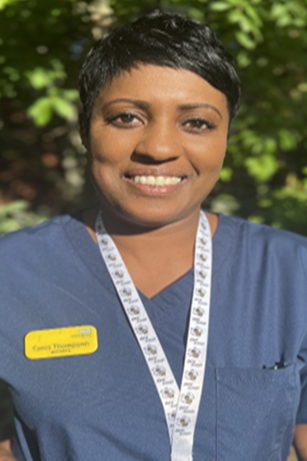
Tania Thompson is a midwife at NBT. Here, she shares her story of growing up in foster care and getting her midwifery qualification after multiple attempts at applying:
Could you tell us about your career journey and educational background?
I am 52 years old and originally from Ipswich. I was brought up in the care system. My parents left me and my siblings when I was 5 years old, and I was fostered by a wonderful couple. My birth parents were a Jamaican mother and a black father. I was fostered by a wonderful couple, a white English mum and a Jamaican dad.
I commenced my journey to midwifery at the age of 39. As my previous qualifications were no longer relevant, I had to attend an Access to Health and Social Care course at college before I could apply to university. I completed the course successfully and sent my application to the University of the West of England. I was unsuccessful at the interview, which was very disheartening, but I knew this was down to my lack of knowledge - nothing more. I took all the advice they gave me, worked for a year as a carer, and re-applied a year later. This time I wasn't offered an interview due to my answers to the biographical questionnaire which were similar to the previous application. I was devastated but not willing to give up.
I attended the university open day and waited for the Midwifery lecturer all day until she had finished. I spoke to her regards my application being unsuccessful and she asked me to come in and interview again. This time I was successful, and I cannot thank her enough as I'm not sure if I would have tried again for a third year. I qualified in September 2014 with first-class Honours. Since qualifying I spent time working on the Central Delivery Suite and Birth Suite before going out to the community for four years continuously building my knowledge, working with a wide range of people. I then decided it was time for me to return to the unit. I always knew that my passion was supporting women in the labour ward that had risk factors involved, so I interviewed for a core position. Three years later with lots of encouragement, I began the transition to the Band 7 Labour Ward Coordinator programme. I completed this and received excellent feedback. I have since interviewed for a seconded post for a year to cover maternity leave and I am currently in that post.
What made you choose the particular area you work in now?
I had my first pregnancy at an early age. I absolutely adored my midwife. She didn't judge me and supported me extremely well. I remember at the time thinking that I wanted to make that positive impact on someone's life as she had on mine, but I never thought for one minute that I was intelligent enough to pursue such a career so put it to the back of my mind. She was my inspiration for becoming a midwife.
What qualities are essential in your position?
Essential qualities of the role include being calm, approachable, empathetic, and an excellent communicator. The labour ward is usually a very busy place, and you need your team to feel confident in your leadership skills. It is imperative to have excellent situational awareness at all times, know your limitations, and work effectively with the multi-disciplinary team (MDT). A good sense of humour at the right time also helps.
What obstacles have you faced and overcome?
Other than not getting a second interview and being resilient using my initiative, I think the only obstacles I have faced have been my own self-doubt. Not believing in myself and my own capabilities. I have always been encouraged and put forward by my colleagues, and managers etc, but always doubted myself.
What role, if any, do you think that race has played in your career progression?
Personally, I have not faced any form of prejudice here at Southmead. What I have noticed though is that since Black Lives Matter and the death of George Floyd, people are more conscious and worried, they may say the wrong thing, sometimes looking at me for confirmation. I'm not offended by this at all. Many were unaware that white privilege was a thing and felt the need to apologise to me and educate themselves further. This touched my heart. I spoke to them openly about my fears as a black woman for myself and my family. Fears that should not exist.
Did you have a mentor or role model?
My foster parents always wanted me to do well. They saw my potential and capabilities. My dad was so proud that I was at university studying midwifery. He was beaming when I told him and loved me talking about my studies. In my second year, my dad passed away. I was devastated but continued.
My parents would be so proud of me today. In all honesty, there was no one that I looked up to or influenced me at the time. I just knew I had to do something with my life. It was up to me to change things and with the full support of my three children and husband, this is where I am today.
Do you have any tips for interviews and career progression?
To be honest I absolutely dread interviews. I'm well known for it, and I have let this hold me back a few times. But generally, my advice would be to be well prepared. Read everything and learn it. Trust in yourself that you are good enough for the job and they need you. Think about the question asked and don't go off on a tangent (I usually do this and have to draw myself back in). Stop and breathe...
Divya's story
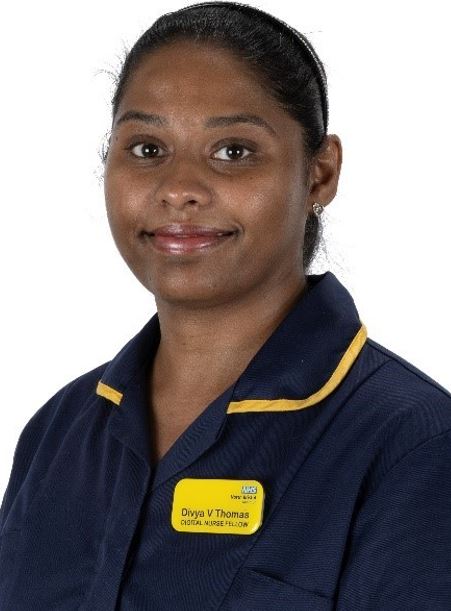
Divya Varikkamakel Thomas is a Digital Nurse Fellow at NBT. Here, she shares her story of her passion for new technology and supporting her colleagues through digital changes:
Could you tell us about your career journey and educational background?
I am a Digital Nurse Fellow in Medicine. I am skilled in Cardiology. I started my journey with NBT in June 2021. My role involves helping the staff with digital adoption, sorting out access issues, training staff, encouraging digital behavioural changes and much more. I enjoy teaching and helping others. At times it can be challenging to explain the vision to doubtful minds. However, it can be quite rewarding when you help them see and appreciate the possibilities.
What made you choose the particular area you work in now?
I’m passionate about new technologies and digital transformation.
What qualities are essential in your position?
As a Digital Nurse Fellow, I am happy to help my colleagues even with something as simple as setting up their email on the phone. It requires a lot of patience, determination, and a knack for tech. There are so many hearts and minds involved in my role as a Digital Nurse Fellow.
What obstacles have you faced and overcome?
Lack of experience, skills and performance at work were the obstacles I faced when I first applied for a job overseas.
Being a self-motivated person helped me a lot. I tried to remain calm and positive and pick up the skills through learning and development opportunities. I always tried my best to not see obstacles as let-downs.
What role, if any, do you think that race has played in your career progression?
Absolutely not. Race has not played any role in my career progression.
Did you have a mentor or role model?
My dad is my role model and he taught me that failure is a stepping stone to success.
Do you have any tips for interviews and career progression?
Be ambitious. A fear of making mistakes will hold you back from making progress. Rather, learn from your mistakes and see how you can improve in the future.
Claire's story
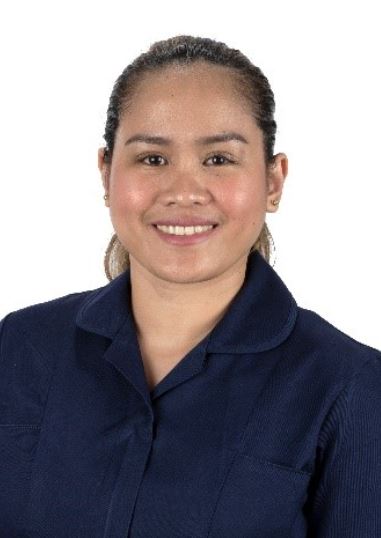
Claire Empleo is an internationally educated nurse who works in NBT's Urology and General Surgery department. Here, she shares her story of practicing nursing in the Philippines and the challenges involved in relocating to the UK:
Could you tell us about your career journey and educational background?
My career journey as a nurse has been a fulfilling odyssey. I embarked on this path with a deep passion for healthcare, earning my Bachelor of Science in Nursing (BSN) degree from the University of Cebu - Banilad Campus, Cebu City, Philippines. Armed with foundational knowledge, I began my nursing career in a busy government hospital in the Philippines, honing my clinical skills and nurturing a profound commitment to patient care. Along the way, I committed to enhance my knowledge through continuous learning. I have worked in 3 different countries such as the Philippines, Dubai UAE and here in the United Kingdom, these experiences have moulded me into a dedicated and adaptable nurse, ready to face the challenges and joys of this noble profession. I joined in this Trust last January 2021 as a Band 5 nurse in 32B Surgical Admissions Unit and recently promoted to Band 6 last June 2023 in 26B Surgical Short Stay coordinating staff activities and ensuring optimum patient safety.
What made you choose the particular area you work in now?
Choosing to work in an adult surgical ward was driven by a combination of personal passion and professional fulfilment. From a young age, I've been captivated by the intricate world of medicine and the prospect of helping individuals regain their health. My fascination with surgery, in particular, led me to pursue a career in a surgical setting, where I could witness transformative interventions firsthand. Additionally, the challenging and dynamic nature of adult surgical nursing appealed to my desire for continuous learning and growth, making it a natural choice for me to contribute to patients' well-being and recovery in this specialized field.
What qualities are essential in your position?
As a Band 6 nurse, several essential qualities are indispensable for success in this demanding role. Clinical expertise tops the list, as it ensures the delivery of high-quality patient care. Effective communication skills are equally crucial, enabling clear interactions with patients, their families, and the healthcare team. Leadership and decision-making abilities are vital for guiding junior staff and making critical clinical judgments. Compassion and empathy are fundamental for providing holistic care, while adaptability ensures the ability to navigate the ever-evolving healthcare landscape. Finally, a commitment to continuous learning and professional development is essential to stay updated and deliver the best possible care to patients.
What obstacles have you faced and overcome?
As an internationally educated nurse who embarked on a journey to the United Kingdom, I encountered several formidable obstacles. The foremost challenge was adapting to a new healthcare system, relearning protocols, and acclimating to British medical terminology. Additionally, I faced the hurdle of obtaining UK nursing registration, which necessitated navigating complex paperwork and fulfilling stringent requirements. Cultural adjustments, including effective communication with patients from diverse backgrounds, presented another challenge. Nevertheless, with determination, perseverance, and a commitment to lifelong learning, I successfully surmounted these obstacles, enhancing my nursing skills and contributing positively to the UK healthcare landscape.
What role, if any, do you think that race has played in your career progression?
Race has had a notable but nuanced impact on my career journey. As a person of colour, I've occasionally encountered stereotypes and biases that presented challenges. However, these experiences have also fuelled my drive to break barriers and contribute to a more diverse and inclusive workforce. Moreover, I've been fortunate to have mentors and allies who recognized my skills and potential, providing valuable support. While race may have influenced some aspects of my career, my determination and abilities remain the primary drivers of my progression.
Did you have a mentor or role model?
Throughout my journey to become a nurse, I was fortunate to have a mentor who played a pivotal role in shaping my path. This experienced and dedicated nurse not only shared their clinical knowledge but also their passion for patient-centred care and advocacy. Their mentorship fuelled my determination and instilled in me the importance of continuous learning and compassionate nursing practice. Having a mentor has been instrumental in my nursing career, serving as a guiding force that continues to inspire and drive my commitment to the profession.
Do you have any tips for interviews and career progression?
Navigating interviews and advancing in a nursing career within the NHS requires a strategic approach. Firstly, thorough preparation is key. Familiarise yourself with NHS values, policies, and the specific role you're applying for. Showcase your commitment to patient care and alignment with NHS principles.
During interviews, emphasize your clinical expertise, teamwork, and communication skills. Provide specific examples of how you've positively impacted patient outcomes or resolved challenges. Additionally, stay up-to-date with current healthcare trends and NHS initiatives.
Career progression involves continuous learning and development. Seek mentorship, engage in additional training, and pursue higher qualifications. Demonstrate leadership potential by taking on new responsibilities and showcasing your dedication to quality patient care. Lastly, actively participate in NHS networks and professional associations to stay informed and connected in your field.
Angeline's story
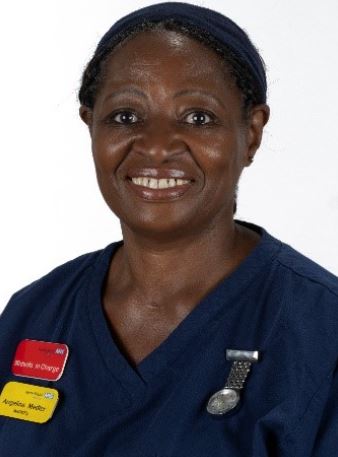
Angeline Medler is a Band 7 Central Delivery Suite Coordinator at NBT. Here, she talks about the importance of positive role models and mentors, and what attracted her to midwifery:
Could you tell us about your career journey and educational background?
I qualified as a Registered General Nurse in 1987 (Gloucester School of Nursing). Diploma of Higher Education in Midwifery 2000 / Degree in Midwifery 2007 both acquired at UWE.
What made you choose the particular area you work in now?
During my midwifery training I knew soon enough that I enjoyed working in an acute clinical setting on the delivery suite. You are able to utilise all your clinical skills, every shift brings challenges, and you are continually learning. You meet many women and partners from all walks of life, I hope in some small part to support in a positive experience of childbirth.
What qualities are essential in your position?
To be approachable, knowledgeable in your clinical area, supportive, calm under pressure and a team player.
What obstacles have you faced and overcome?
It took sometime including repeated interviews to gain my present role as a Band 7 CDS coordinator. I think the obstacle was my lack of self belief that I would ever be successful, with plenty of support from my colleagues I applied again and here I am.
What role, if any, do you think that race has played in your career progression?
I have never felt that race has played a role in my career progression. I have always had lots of support and encouragement to progress in my career.
Did you have a mentor or role model?
Over many stages in my career I have had several role models who have guided and supported me.
Do you have any tips for interviews and career progression?
Do your homework, prepare, and prepare again. Seek support and guidance prior your interview from experienced colleagues. Understand the job description. Undertake some 'dummy' interviews with a colleague. Get involved if you have certain interests in your clinical area, take on other responsibilities.
Ali's story
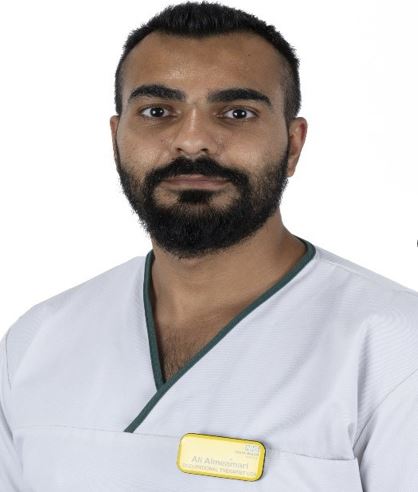
Ali Almeamari is an Occupational Therapist (OT) at NBT. Here, he shares his story of relocating to the UK from Bahrain, and his career transition from mechanical technician to occupational therapy:
Could you tell us about your career journey and educational background?
I was born and grew up in Bahrain (ethnically Iranian/Persian). I started off in the UK as an OT student and worked as a healthcare assistant on bank shifts. I had no prior healthcare experience when I was living in Bahrain. I only had a high school diploma. I did mixed jobs fresh from school, working in call centres/sales/ mechanical technician in Bahrain. My intent was to study abroad and find a job there to migrate.
What made you choose the area you work in now?
I always liked healthcare and helping others. The caring aspect of the role looked very fulfilling, and I was a mechanical tech working in a factory in Bahrain. I did not enjoy the job after six years and then decided to apply for University in the UK. I had saved enough money to apply. I found an international educational consultancy agency that recommended Bristol and UWE. Initially I did not know which part of the Allied Health Profession I wanted to do (Physio or OT). I chose occupational therapy after researching it and discussing it with the university.
What qualities are essential in your position?
Key qualities to have in this role are the ability to be caring, patient-centred, having a holistic approach, understanding people’s social backgrounds and impact on their daily life, a rehabilitative approach, empathy, promoting independence and health and a team player.
What obstacles have you faced and overcome?
Some cultural differences and differences in the healthcare system. I learned and understood them through university and through my part-time job. Have also learned a lot from friends I have made in the UK. My advice to all is don’t be afraid to ask questions.
What role, if any, do you think that race has played in your career progression?
None.
Did you have a mentor or role model?
Yes, I had a mentor while I was a student and when I was a Band 5 (two) and currently a Band 7 mentor. All my mentors were supportive.
Do you have any tips for interviews and career progression?
Yes -prep, prep, prep! This was a shock to me as interviews in Bahrain were completely different, people don’t really prep for it. I have learned that you can prepare for an interview and that makes a massive difference. In the first OT interview that I had, I didn’t really prepare and did not get the job. The next two I prepared well for most likely questions to come based on the department and got the jobs. Don’t be afraid to apply for role progression, ask your supervisor for support, even if you don’t get it you will have gained more experience for the next interview. I started off as a band 5 OT and have recently progressed to a band 6 OT.
Honeylyn's story
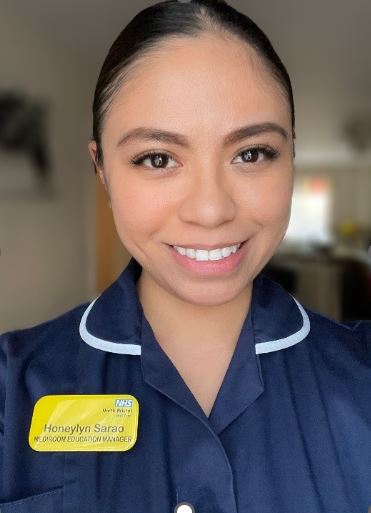
Honeylyn Sarao is a Medirooms Education Manager at NBT. Here, she shares her story about her role in the patient journey and the importance of good mentors:
Could you tell us about your career journey and educational background?
I have been working for the NHS for 12 years now. I joined NBT as a Registered Nurse after graduating in 2011. I have worked here ever since and now working with a great team and doing the role that I love and enjoy as the Medirooms Education Manager.
What made you choose the particular area you work in now?
Working in the Medirooms enables the staff to be multi-skilled. We look after patients from different specialities pre and post-operatively. My role enables me to be on the frontline as a patient’s advocate and be part of the “patient journey”. You will always learn new skills and knowledge in our department and your professional growth continues.
Being part of the Recruitment, Retention, Wellbeing/Perioperative Development team as the Education Lead, I am at the forefront to support the development pathway of all staff across all bands, students, and apprentices. Our team has always taken active roles in promoting education and training within the department and we carefully plan and execute ideas for the betterment of staff and patient safety.
What qualities are essential in your position?
The list is endless, but to name a few, I believe that being understanding, supportive, being credible, reliable with good interpersonal/communication skills, highly organised, patient-focused, must be willing to accept constructive criticism, adaptable, and able to share feedback to colleagues on a regular basis (to help colleagues develop and strengthen their potential). Being a role model, maintaining professionalism at all times, helping build a positive working culture, and always having the drive to continuously ensure maximum standards of clinical practice and support/guide colleagues whatever the situation may be.
What obstacles have you faced and overcome?
The early stages of my post (as part of the Perioperative Development team) were slightly challenging as we were tasked to lead multiple projects. But with the support and help of my co-practice Facilitators and managers, we were able to successfully implement the project and these ideas are now widely adopted within the department.
What role, if any, do you think that race has played in your career progression?
I feel fortunate to have worked with a team that values my work ethic and hard work and I don’t personally feel that race has impacted my career progression.
Did you have a mentor or role model?
Certainly, my previous and current managers have supported me throughout and played key roles in enabling me to be where I am today.
Do you have any tips for interviews and career progression?
When preparing for an interview, always read the job description and person specification. Interviewers always notice and see the difference when candidates study/research the role that they are applying to. Prior to the interview, I highly recommend the applicants approach the person who advertised the job to have a better understanding of the expectations, roles, and responsibilities of the post.
In terms of career progression, it’s good to have an idea of what you desire for your career path long term. Take advantage of the training and development opportunities available to you and discuss your goals with your managers. Ultimately, go for a post that you know you will enjoy as it will certainly bring out the best in you.
Gifty's story
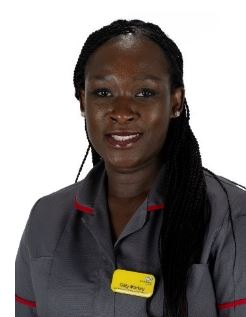
Gifty Markey is NBT's Associate Chief Nursing Officer for Mental Health, Learning Disability, and Neurodiversity. Here, she shares her story of coming to the UK from Ghana and using her voice as a Black woman to advocate for others:
Could you tell us about your career journey and educational background?
I was born in Ghana and studied to a degree level at the University of Ghana – (BA Hon English and Theatre Arts) in 1999. When I came to the UK, my mum wanted me to be a lawyer, but I decided to study mental health nursing as I felt I could make a meaningful contribution to society and make an impact through nursing. Over the years, I was able to gain the following qualifications in the UK as part of my professional growth:
- Dip HE Mental Health Nursing (UWE)
- BSc Mental Health Nursing (UWE)
- MSc Leadership and Organisation in Public Services (UWE)
- Non-Medical Prescribing (Bournemouth University)
I have worked as a Mental Health Nurse for over 20 years in various NHS organisations. I joined NBT in May 2021 as Head of Patient Experience and this was a great opportunity for me to understand the world of an acute hospital and champion the patient voice. As a mental health nurse, I remained passionate about my expertise in Mental Health and in May 2023 I was successfully appointed as an Associate Chief Nursing Officer for Mental Health, Learning Disability and Neurodiversity. I am thoroughly enjoying this role particularly supporting the clinical teams to meet the needs of patients with the diagnosis of Mental Health, Learning Disability and Autistic patients. I could not have wished for anything better.
What made you choose the particular area you work in now?
I am passionate about advocating for the vulnerable and my career has given me the opportunity to do this in several roles. Over the years, I have worked as a staff nurse, team leader, ward manager, clinical manager, consultant nurse, non-medical prescriber, and head of nursing. It’s been a privilege to work with people in their most vulnerable states, supporting them in a compassionate and non-judgemental way. Holding hope for my patients when caring for them is fulfilling. This is my “why” and what draws me to be a mental health nurse. In my current role, I am privileged to work with the great NBT staff in different teams to ensure that patients’ mental health is seen as equally important as their physical health.
What qualities are essential in your position?
- Accountable and compassionate leadership
- Good listening skills, adaptability, professional curiosity
- Empathy and compassion
- Kindness, courage, curiosity, respect for others
- Being a good team player
What obstacles have you faced and overcome?
Being born and educated in Ghana, I had to consciously adapt myself to the UK environment. Undertaking my nursing degree in the UK was a great experience as this was very different from Ghana. I needed to come to speed quickly with my IT skills and adapt myself culturally to fit in while maintaining my identity. Over the years, mentoring and coaching have helped me to overcome this, and I continue to work on this as every day is different and different circumstances require adaptability to meet patients’ needs and organisational objectives.
What role, if any, do you think that race has played in your career progression?
My race has given me the opportunity to bring diversity to my areas of work. I have valued my uniqueness and maintained my authenticity while respecting what others bring to the table that is different from me. I have been quite fortunate in that my race has sometimes opened doors for me that would have been shut. My race has therefore played a positive role for me in many situations. At my level, I sometimes find I am the only black person in the room, and this has helped me to use my voice appropriately for the benefit of others. There are times when I have faced barriers in work and in my career development, but I have remained self-aware of my own limitations and have sought help and coaching to make me more effective.
As a black woman, I sometimes feel there is pressure to prove myself more and justify my seat at the table. This can be challenging sometimes but I have always remained positive and continue to work on myself and, my professional development. I use every opportunity to seek feedback to help improve myself. I am very comfortable and proud of my race and this positive view of self has helped me in many ways.
Reynold's story
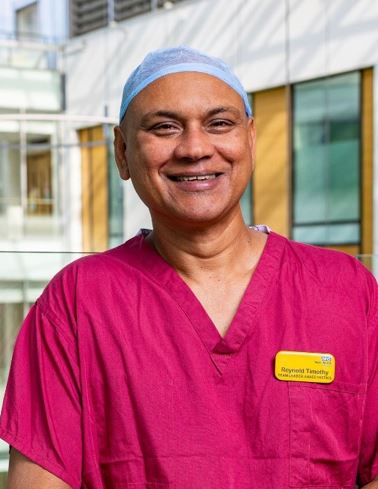
Reynold Timothy is a Band 6 Team Leader in Anaesthetics at NBT. Here, he shares his story of working in Anaesthetics, thinking positive and being prepared for anything:
Could you tell us about your career journey and educational background?
I arrived from the Caribbean Island of Trinidad in 1991 and worked in the private sector. I joined NBT in 2008 and worked as a Healthcare Assistant in the Operating Theatres at Frenchay Hospital. For me working in theatres was not only interesting, but I enjoyed working as part of a great team of people with different roles and background. In 2009 I applied for the Operating Department Practitioners (ODP) course at Oxford Brookes University. After I qualified, I applied to work as an Anaesthetic ODP in theatres and have now taken on a more senior role as Team Leader in Anaesthetics.
What qualities are essential in your position?
As Team Leader in Anaesthetics, it is important to have good leadership skills, the ability to keep up to date with new practices and ensuring that patients and colleagues are getting the best of my abilities.
What obstacles have you faced and overcome?
I have had setbacks, but I’ve also had support from amazing people. I prefer not to dwell on life’s negatives, but to think positive and move forward with strength and confidence.
What role, if any, do you think that race has played in your career progression?
At NBT I have been very fortunate to work with an amazing team of ODPs, Nurses, Anaesthetists and Surgeons and I believe that I have always been fairly treated by everyone.
Did you have a mentor or role model?
It’s really interesting that I had a mentor who was also from Trinidad, she would say to me that when you’re from abroad you have to work twice as hard.
Do you have any tips for interviews and career progression?
In Anaesthetics you always have to be prepared and ready for emergencies; when you are prepared it gives you the self-confidence needed for a successful outcome.
Naureen's story

Naureen Samnani is a Clinical Preceptorship Lead – Band 7. Here, she shares her story of working in nursing roles for 18 years and discovering a passion for teaching others:
Could you tell us about your career journey and educational background?
I have more than 18 years of nursing experience in various clinical, educational and leadership roles. I was qualified as a Registered Nurse in 2004 from the Aga Khan University Hospital, Karachi, Pakistan. I then commenced my career as an Intensive Care Unit (ICU) Nurse and advanced as ICU Clinical Educator within the same hospital. I was then relocated to Dubai, UAE in 2012 and have worked in various roles, ranging from ICU charge Nurse, Medical Ward Nurse Manager and Critical Care Educator.
During my career journey, I have led the development and delivery of DHA accredited CPD workshops, evidenced based simulation and clinical skills trainings. I have also presented research projects on ‘Sim-Resuscitation in ICU’ and ‘Ventilator Management in ICU’ at various large-scale scientific conferences. In addition, I have created nursing departmental competencies and have been instrumental in monitoring their compliance across the Trust. I initiated and successfully completed a project on ‘Electronic medication administration in medical wards and its impact on reducing medication errors’.
I moved to the UK in 2019 to further develop my career and started as an ICU Nurse in NBT. Within less than a year, I got an opportunity to work as the Clinical Education Facilitator supporting Trainee Nursing Associates and Registered Nurse Degree Apprentices during their apprenticeship programme. With my current role as preceptorship lead, I support and facilitate all the newly registered practitioners (Registered Nurses, Midwives, Nursing Associates and Allied Health Professionals) during the first year of their transition from student to autonomous practitioner. I also deliver and facilitate Preceptorship Progress study days and perform regular checks that Preceptor/preceptee relationship is working satisfactorily. In addition, I monitor and track the completion rates for all preceptees and evaluate quality assurance of the programme ensuring it operates within HEE and National Preceptorship standards.
I have successfully completed a master’s module “Practice Learning and Student Support” from UWE and am working towards completing other modules. I have also achieved NHS Leadership Academy Award from the Healthcare Leadership Foundation.
What made you choose the area you work in now?
I have a great passion for clinical education, teaching, and learning. I am very keen to develop students and learners to the best of their potential. As a nurse leader, improving quality and patient safety are my priorities therefore, I always try to ensure that an evidence-based approach and professional regulatory standards are embedded into their learning.
What qualities are essential in your position?
Clinical knowledge and competence, strong interpersonal and communication skills with the ability to create a positive learning environment, being collaborative, innovative, and highly organised, having the ability to mentor and inspire others, being a lead change agent, and embracing technology and digital solutions.
What obstacles have you faced and overcome?
When I started as an international nurse in the UK four years ago, I had some perceived thoughts and fears of discrimination, language bias, unequal opportunities, and lack of recognition. However, the level of support provided by NBT has helped me to integrate into the nursing workforce professionally and culturally. One of the major obstacles that hindered my development was fear of failure and self-doubting my potential. I have overcome this by taking every challenge as an opportunity with the ‘yes I can’ attitude.
What role, if any, do you think that race has played in your career progression?
NBT and the Clinical Education Team have provided me with great opportunities and support in my career progression without any racial discrimination. I can confidently say that my skills and expertise are well recognised and valued at NBT
Did you have a mentor or role model?
During my 18 years in the nursing profession, I have come across various mentors and role models whom I am inspired by. They have motivated, supported, and nurtured me brilliantly for my progression, growth, and personal development.
Do you have any tips for interviews and career progression?
To be successful in any interviews, I would suggest focussing on the three Ps = Preparation + Practice + Positivity. Preparation is the most crucial part, not only the technical knowledge about the job role but all-inclusive approach including researching in depth about the organisation’s vision and values, preparation of general questions and presentation. Practice - speaking in front of a mirror or holding mock interview with friends etc. and Positivity - body language, tone of voice and appearance.
My takeaway point is ‘Always believe in your capabilities and grab any developmental opportunity with positive ‘yes I can’ attitude. Be confident and strive to inspire others.
Omowumi's story

Omowumi Olamiju is a Ward Sister and Band 6 Internationally Educated Nurse at NBT. Here, she shares her story of being an internationally educated nurse in the UK and actively driving her own learning and development:
Could you tell us about your career journey and educational background?
I have been a qualified RN in Nigeria since 2013 (Diploma), after which I completed my nursing degree in the year 2018 and migrated to the United Kingdom in June 2021 to become an Adult RN starting off my career with NBT. In almost 3 years working at NBT, I have worked in the Medirooms (theatre recovery) for 2 years and recently moved up the ladder to become a Band 6 RN in a surgical short-stay unit(26B). In my years of practice within the NHS, I have had the opportunity to be a beneficiary of the Florence Nightingale Foundation (FNF) scholarship for the IENM Online Leadership Programme and have gone on to become a community member of the prestigious FNF. On becoming an alumnus of the FNF, I have also been able to enrol in courses that have greatly motivated me as an internationally educated nurse.
What made you choose the area you work in now?
I needed to explore my desire for growth and decided to take up a Band 6 role outside of the recovery unit to a surgical bed unit. This has tremendously helped me get better in human management which I believe serves as a springboard to a higher course in the near future.
What qualities are essential in your position?
Excellent human relations, good communication skills, continuous self and professional development, the patience to lead by example, and perseverance are all essential in making an exemplary leader.
What obstacles have you faced and overcome?
In past times, I had erroneously believed I would find it difficult moving up the career ladder as an internationally educated nurse, however, I got encouraged by stories of other IEN within and outside NBT who have become senior nurses within the NHS and then I started making applications to my roles of interest and now I am here.
What role, if any, do you think that race has played in your career progression?
I have been able to receive help from other BAME nurses especially in my formative years and in my current role within the NHS which has tremendously helped me become confident in identifying that I can attain whatever height I desire if I put in the desired effort.
Did you have a mentor or role model?
Yes, Nayir Lopes Fernandes Cisse was my mentor on starting my career within NBT, she was greatly helpful and made sure I was on track with getting the required training and competencies completed within the expected time frame.
Do you have any tips for interviews and career progression?
Having a goal board of how and when you want your career progression to begin, taking up mentorship, leadership, and management courses both credit and non-credit bearing as they will help build your wealth of knowledge and leadership skills which are always relevant in taking up senior roles. Lastly, I would say keep pushing, if no one can, ‘YOU CAN DO IT AND I CAN DO IT’.
Lady Hazel's story
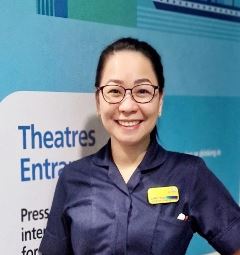
Lady Hazel Ligsay is a Medirooms Team Leader at NBT. Here, she shares her story of working in Medirooms and the cultural challenges she faced as a nurse relocating to the UK:
Could you tell us about your career journey and educational background?
My nursing career started in 2006 when I graduated Bachelor of Science in Nursing, and I passed the licensure exam in the same year. I applied for a job, and I was hired by one of the Joint Commission International Accredited hospitals in the Philippines, which I have worked for more than 8 years. I worked in different areas such as Medical Surgical ward, Ob-gynae and Intensive Care Unit and became a charge nurse in ICU.
I worked in Singapore for 3 ½ years as an Anaesthetic and Recovery nurse. I decided to seek further experience in the UK and I was fortunate to be employed by NBT in 2020 and was assigned to Medirooms. Two years later, I was successful in being appointed as a Band 6 Mediroom Team Leader. I am grateful for the opportunity, and I am happy to be working in a supportive environment that motivates me to do my best.
What made you choose the area you work in now?
For the past 17 years of my nursing career, I have experienced working in different areas, I have enjoyed every part of it, but I will always have my favourite. I love working in Recovery and when I secured a job in NBT, I was thankful that I was assigned to Medirooms. I have never thought of working anywhere else.
Medirooms has a unique set-up compared to the traditional recovery where I previously worked. As a nurse, I was able to be a part of a patient’s whole journey, from admitting the patient to recovery, to discharge or transferring the patient to the ward/ICU. It has a comprehensive approach to surgical care. In addition to that, the people I am working with and the kind of environment we have are great contributing factors to my choice to stay in this area.
What qualities are essential in your position?
What makes a good team leader can depend on the specific team and goals, but I believe that there are 5 essential qualities that are needed in my position:
- Clinical expertise.
- Leadership
- Good communication skills
- Critical thinking
- Empathy
These qualities, combined with dedication and commitment to our jobs, will enable us to provide exceptional care and create a positive work atmosphere, which will result in us achieving our common goals.
What obstacles have you faced and overcome?
Moving to another country was quite challenging but also rewarding. Some of the obstacles I have encountered were language barriers, cultural differences, and anxiety over being discriminated against, however, through time, patience and support I was able to overcome all of these. Sometimes, fear of the unknown is what makes me more anxious, so I empower myself by familiarising myself with the things I am not accustomed to. I also seek help and support from my managers, mentors and colleagues.
What role, if any, do you think that race has played in your career progression?
I don’t think that my race has played a role in my career progression. NBT has an inclusive workplace culture and embraces diversity, and I am grateful to be given as equal an opportunity as others. I have never experienced being discriminated against because of my colour or race.
Did you have a mentor or role model?
Yes, and it is difficult to mention only one. I have numerous mentors and role models, these are the people that I have met through the course of my nursing career, who helped me to achieve my goals by sharing their insights, knowledge and expertise that significantly shaped and influenced me positively in my personal and professional growth.
Do you have any tips for interviews and career progression?
Prepare yourself for interviews, educate yourself about policies and procedures and don’t be afraid to step up or progress your career. Be open to change and new challenges and surround yourself with supportive people that will encourage you and influence you to do better and never be afraid to ask for help if you need to.
Jaimon's story

Jaimon George is a Senior Charge Nurse at NBT. Here, he shares his story of studying nursing in India and building a supportive network of friends and mentors:
Could you tell us about your career journey and educational background?
I have been a Registered Nurse for the last 25 years. I completed my nursing studies in India and worked in various hospitals in different states. My nursing journey continued as started working in the UK in 2002. My nursing career started with the NHS in 2003.
What made you choose the area you work in now?
I have always worked in acute settings whether this was medical or surgical. The confidence I have gained from these areas helped me to work in any clinical setting. Rather than choosing my own work area, I have delivered what NBT required as a leader and clinical expert.
What qualities are essential in your position?
The qualities essential for my position are communication skills, being caring, responsive, supportive, and knowledgeable about policies and procedures as well as our NBT values.
What obstacles have you faced and overcome?
Developing strategic and tactical communication skills, cultural differences, and feelings of non-inclusiveness. Not having extended family close by and struggling to raise a young family while managing other financial commitments. Another obstacle has been not always having clear guidance or advice on career progression and opportunities.
What role, if any, do you think that race has played in your career progression?
The obstacles I have mentioned kept me behind and made me less ambitious about career progression for a long time. Looking back, I wish someone had told me what I could do with my experience or explained the opportunities available to me. Finding ‘’myself’’ was a great challenge.
Did you have a mentor or role model?
I didn’t have any mentors specifically but had a friends’ network that helped me to shape up my personality and leadership. Thinking of role models, it’s difficult to say that I had a specific role model but I have learned from different people as I come across them during my work and life in general.
Do you have any tips for interviews and career progression?
My tips for interviews are:
- Have a clear understanding and knowledge of the job role
- Communicate simply and genuinely
- Show a genuine desire to obtain your goal
- Dress smartly
- Show emotional intelligence
- Ensure that your behaviour reflects NBT values
Career progression should be your ambition all the time. Ensure you are up to date with training and always take steps to add new skills and qualifications by doing courses offered by your organisation - in other words, build yourself a portfolio that gives you a competitive advantage.
Pooja's story
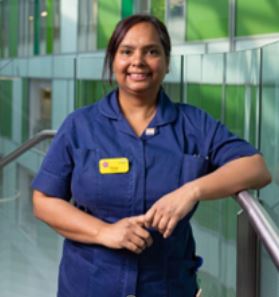
Pooja Poddar is a Band 6 Sister in NBT's Medical Day Care Unit. Here, she shares her story of breaking cultural barriers and gender stereotypes, and looking to Indian history for her feminist role models:
Could you tell us about your career journey and educational background?
After my school education, I went to college and studied commerce, then graduated in arts. Professionally, I did a nursing diploma in India.
What made you choose the area you work in now?
Being raised as a proud Sikh girl, doing nursing was definitely NOT what my parents had in mind for me. I wanted to do something to break community barriers.
What qualities are essential in your position?
Care, compassion, empathy loyalty, and honesty are all textbook qualities definitely required to be a passionate nurse. I personally think communication is the key to showcasing all your qualities.
What obstacles have you faced and overcome?
We are now living in a very competitive world; my failures have taught me to see the same things in a different light. After managing an A&E in an Indian hospital in Mumbai, coming to the UK and working hard to register to work as a qualified Nurse was a bit of a journey. However, it was easy for me to break cultural barriers as I come from a diverse part of Mumbai.
What role, if any, do you think that race has played in your career progression?
I have always worked hard to achieve my goals on my own merits. Race hasn’t played a role in my career.
Did you have a mentor or role model?
Rani Laxmibai was the Maharani Consort of the princely state Jhansi (India). She was one of the leading figures in the Indian Rebellion of 1857. Her work on women's equality is what struck me most.
Do you have any tips for interviews and career progression?
Make the interviewer believe in your potential to be successful, be honest, have a clear plan of what your goals are, and be realistic.
Mordecai's story
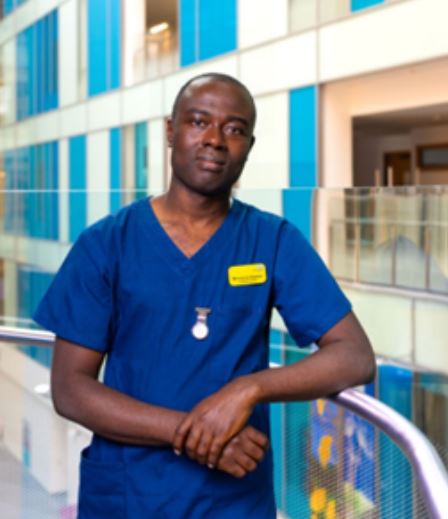
Mordecai Dadzie is a Charge Nurse and Band 6 Internationally Educated Nurse at NBT. Here, he shares his story of working as a nurse during the Covid-19 pandemic and learning new skills on the job whilst dealing with grief in his personal life:
Could you tell us about your career journey and educational background?
I have been working as a nurse for over 10 years. I qualified as nurse in Ghana at the nursing and midwifery college. It all started in February 2013 when I worked in a government hospital for 5 years as a staff nurse. I migrated to the UK in February 2018 and worked as a registered nurse in a care home for about 3 years. I did further studies in nursing with the University of Sunderland. I joined Southmead Hospital as a Band 5 nurse in January 2021 and got promoted to a Band 6 role in May 2023.
What made you choose the area you work in now?
I interviewed to work on the endocrine ward, but the day before I started work at the hospital, I had a call from the recruitment office that Ward 26B was in need of nurses urgently so I should work on 26B (general medicine and stepdown cardiology) instead of the endocrine ward I was interviewed for.
Ward 26B used to be general medicine and stepdown cardiology, but this has been changed and we are currently a surgical ward (Urology) and I am learning and enjoying the experience.
What qualities are essential in your position?
Being a team player - I’m able to liaise with my nursing team and other members of the multi-disciplinary team to achieve positive patient goals. I teach colleagues, especially the newly recruited overseas nurses about ways to care for patients on the ward.
Planning skills - I help create action plans for the ward and include specific training on LEARN for the staff to complete. This helps improve our overall standard of care.
Communication - As a Band 6 nurse, I have people I supervise. I avail myself to listen to concerns from my team and assist them where I can. I refer them appropriately when I’m unable to help.
Tactfulness - I’m able to demonstrate my nursing skills at work and show sensitivity when dealing with colleagues and when caring for patients.
IT skills - I have good computer skills and I’m one of the digital link nurses on the ward. I train staff on how to use some of the NBT software and also assist new staff to get login access to some NBT software.
What obstacles have you faced and overcome?
I started as a Band 5 in the middle of the COVID-19 peak period. There wasn’t enough support for me on my ward as these were really uncertain times. Work was so stressful, and I had to learn from my mistakes which enabled me to grow. I was sometimes afraid to go to work. This was a great challenge but a good opportunity to grow.
Just when I got my Band 6 promotion, my dad passed away and I had to travel to Ghana for my dad’s funeral. While at the funeral, Ward 26B which was a medical ward was changed to a surgical ward.
My difficulty was that while I had to learn in my new (Band 6) role, I also had to start gaining experience as a surgical nurse. I had to do a lot of training as a Band 6 and as a surgical nurse. I was assisted by the other Band 6’s on my ward and my nurse manager. This was really helpful and I am grateful for their support.
What role, if any, do you think that race has played in your career progression?
I don’t think race has played any role in my career progression.
Did you have a mentor or role model?
I don’t have a single person as my mentor or my role model. I learn specific things from different people. I sometimes pick people as my mentors or role models to learn some specific ideas or qualities they have. I find this approach helpful and feel it supports my career growth.
Do you have any tips for interviews and career progression?
Gain more experience in your current role. I have participated in a couple of interviews and what I have learned is that if you have enough experience in your current role, you perform better during interviews, and it propels you to progress in your career.
Training and developing your career can help you gain more knowledge and get you grounded. This will enable you to articulate your thoughts in a better way during interviews and also help you to progress in your career quickly.
Evalyne's story
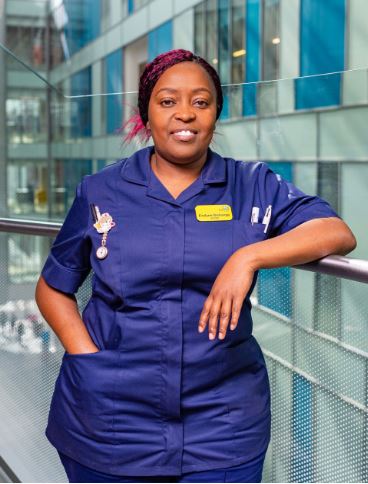
Evalyne Gichanga is a Band 6 Ward Sister at NBT. Here, she shares her story of challenging misconceptions and venturing out of her comfort zone to progress her career:
Could you tell us about your career journey and educational background?
I qualified as a Registered Nurse (RN) in 2017 but have worked in healthcare for a long time before qualifying.
I did my access to nursing in 2000 in London, then became a mum of two. When they were old enough, I was able to resume my nursing career. I was advised to re-do my access to nursing again because I was away from my studies for a long time, but I never gave up. I did my Access to Nursing again in 2013 and I was able to join the University of the West of England (UWE) in 2014-2017.
Since qualifying as an RN, I have done a course in UWE at a master’s level and currently doing NHS Mastering Management in UWE.
What made you choose the area you work in now?
I have always worked in medical wards but in May 2023 our current ward was changed to a surgical ward.
I had a choice to continue to work in a medical ward or stay and train as a surgical nurse and I chose to stay. It wasn’t an easy decision to decide whether to stay and learn new skills as a ward sister or go to my comfort zone in medicine, but I was determined to give it a go and I am glad I did as I am now a skilled surgical nurse too. I can work both in medicine and surgical wards.
What qualities are essential in your position?
A good leader, knowledgeable skills, expertise in nursing practice, flexibility, approachable, can supervise and support staff based on their level of training, confident, adaptable, supportive, able to delegate, a role model, a mentor, open-minded and fair, professionalism, respectful, works well within a team and good communication skills.
What obstacles have you faced and overcome?
To prove that I can be a leader despite my experience in my career, I did two 6 months secondments to get the permanent position I am in now. However, I never gave up, as I had managers who supported me and knew that I had the leadership capability. I also believed in myself. I believe that I am a leader and can do this as I have been a leader in my own community and these skills can be transferable.
What role, if any, do you think that race has played in your career progression?
When I qualified and went to collect my uniform, I was asked “Grey uniform?” And I kept quiet because that was an assumption, and I was asked again. I looked at the staff member straight in her eyes and told her, “Blue uniform”. The sad part is that she never apologised for her assumption, and I was new, so I walked away. This could have affected me, but it has made me stronger and helped me to work hard and efficiently to progress into senior nursing leadership.
There have been other instances where some visitors have hesitated to come to me as they assume I am not the nurse in charge or cannot be the sister of the ward due to my colour. I have always maintained my professionalism and helped them to resolve their problems and then they always thank me after that. This gives me a job satisfaction that I have done my job and not felt intimidated. Now I can overcome such things and am able to support other staff that experience similar situations. This shows there are still assumptions, but I have been able to overcome this and not let this affect my practice and leadership. I know my skills and competence are not defined by my colour.
Did you have a mentor or role model?
I had a manager that encouraged me to apply for the secondment post and that empowered me to apply and that was the beginning of my career progression.
Do you have any tips for interviews and career progression?
Prepare for your interview and give it 100%, don’t be afraid to apply for a post higher than your current one, be true to yourself and don’t compare yourself to anyone.
Jinu's story

Jinu John is a Band 6 Staff Nurse at NBT. Here, she shares her story of relocating to the UK as an internationally educated nurse and adapting to a new culture during the COVID-19 pandemic:
Could you tell us about your career journey and educational background?
l completed my Bachelor of Science in Nursing in 2007 and have worked for the health sector for almost 15 years with a background of diverse nursing specialities. I was working in an American hospital, and Dubai prior to joining Southmead Hospital and had the privilege of working with a comprehensive team of experts to maintain high standards in their service excellence programme.
What made you choose the area you work in now?
I started my career in the UK as an internationally educated nurse in 32A and decided to continue my journey as a band 6 here itself as I felt it is a very challenging and exciting role being a part of the admission unit for frailty
What qualities are essential in your position?
Being resilient in challenging situations, great communication skills. Honesty and integrity while performing duties. Leadership qualities - including service improvement root cause collaboration, resolving conflicts, and being confident.
What obstacles have you faced and overcome?
The major obstacle was to settle in the UK. When I first arrived in 2019 it was a new environment and leaving family and friends behind was not easy. Difficulty in verbal communication with different accents and adjusting to the speed. Adapting to the new life with cultural integration and finally the additional pressure of COVID-19 which brought changes to the clinical working conditions. I was able to overcome all the challenges through perseverance and hard work.
What role, if any, do you think that race has played in your career progression?
I have noticed that race has not been a barrier to my career growth. I was lucky to have an equitable workplace culture.
Did you have a mentor or role model?
Personally, mentorship has played a vital role in helping me grow my career and in shaping me as a person.
Do you have any tips for interviews and career progression?
There are no boundaries to what you can achieve if you believe in yourself and say ‘YES’ to every opportunity.
Deborah's story
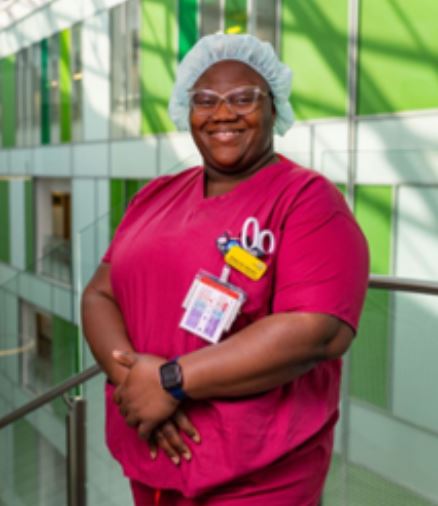
Deborah Akadiri is a Band 6 Anaesthetic Team Leader at NBT. Here, she shares her story of studying nursing in Nigeria and discovering a passion for working in Anaesthetics:
Could you tell us about your career journey and educational background?
I started my nursing journey in 2010 when I enrolled for my Registered Nurse training in a nursing school in Southwestern Nigeria which lasted for 3years. Following my graduation from the school, I worked in different areas ranging for A&E, Male surgical wards and moved into theatres in the year 2014. This move ignited my passion for nursing anaesthesia, so I went ahead to study a Postgraduate nursing anaesthesia programme in University of Nigeria in 2017 and started my career as a Registered Nurse Anaesthetist until I relocated to the UK in June 2021. Moving to the UK, I worked at Walsall NHS Trust as a recovery nurse before proceeding to do my anaesthetic course with Birmingham City University in 2022 to start practising as an anaesthetic and recovery nurse. In July 2023, I took the big leap of faith moving down to join North Bristol NHS Trust where currently work as an anaesthetic team leader.
What made you choose the area you work in now?
As a student nurse, I had numerous interests in different specialty but wasn’t sure even when I did my clinical placement in theatre, but I finally moved to start working there years later and this ignited my passion for Anaesthesia. I see anaesthesia as a branch of nursing that challenges me to better and quickens my thought process.
What qualities are essential in your position?
As an anaesthetic practitioner, I believe you need to be empathetic and have good communication skills. Being an anaesthetic practitioner requires you to have the ability to think quickly and methodically under pressure and also manual dexterity. You also need to have a good understanding of what being a good team player entails and pay delicate attention to details. You will need to be well-equipped with a good understanding of physiology, and pharmacology and understand your limitations.
What obstacles have you faced and overcome?
Since joining the NHS, I've been faced with quite a number of challenges such as racism, bullying and harassment, being treated without dignity at work, stress, and professional burnout, feeling alone and isolated at work amongst many other things. Firstly, I do a personal reflection regarding these situations to enable me see things objectively. Then I tried a lot of times to speak up against such acts for myself and many other international nurses. I personally have found that speaking up against all these acts reduces their impact on fellow international nurses. I took it upon myself to speak to Freedom to Speak Up guardians, HR and as many people as possible who are interested in hearing what I want to say. I find work buddies also very essential as they help you get through this difficult time. It is helpful to have someone who can relate and support better outside the workspace as well. Lastly, if the workspaces become too toxic, I found that leaving those spaces can be therapeutic and good for one's overall wellbeing.
What role, if any, do you think that race has played in your career progression?
Discrimination in career progression is a major barrier for ethnic minority employees. I would like to say that race/ethnicity did not play any role in my career aspirations, interests, or progression. However, being invested in the BAME community at work has strengthened my resilience and enabled me to keep fighting for what I desire. Therefore, it is important that every employee realises that they can achieve their full potential irrespective of their ethnicity.
Did you have a mentor or role model?
I did have mentors and role models and I still do. Having a positive role model/mentor has a lot of positive impact. It helps a person's decision-making and actions, inspires them on a career pathway to follow, help them overcome certain weaknesses and challenges and may offer them a safeguard to job-related stressors.
Do you have any tips for interviews and career progression?
Firstly, you need to remember to set professional development goals to determine what you need to accomplish and develop yourself professionally to better expand your expertise and develop an impressive set of transferable skills. Best advice for the interviews is to be yourself and be prepared. Take your time to put into consideration the person specification and job description of the role you've applied for.
Edward's story

Edward Mabgwe is an Emergency Nurse Practitioner at NBT. Here, he shares his story of becoming aware of inequity for ethnic minorities and representing the NHS's B.A.ME community in his role as a Network Lead:
Could you tell us about your career journey and educational background?
I was born in Zimbabwe and came to the UK in 1998 to study a nursing diploma. I trained at the University of Hertfordshire and qualified in 2003 in Adult General Nurse Project 2000. I have been qualified for 20 years. I got my first job in a Medical Elderly Ward and worked there for a year then moved to A&E in the same Hospital at QEII Hospital Welwyn Garden Centre. I worked there for 2 years and then moved to Cornwall in 2006 after I met my wife who came from the same county.
I joined one of the NHS Community Hospitals, West Cornwall Hospital, in a medical ward for 2 more years then moved to the Casualty Department in 2008 the same hospital where my career started to take shape.
I went through my Emergency Nurse Practitioner (ENP) training – did a Minor Injuries course, finished it in 2014 and became a Band 6. I started practising as an ENP.
I then became involved in the Trust's Black Asian Minority Ethnic (B.A.ME) Network as a lead.
I was then sent by the Trust to London on a course for Workforce Race Equality Standard (WRES) for six months where I met very special people working in different NHS trusts who shared the same ethnic background and learnt about tackling inequalities in the NHS. This was a game changer for me because it made me aware of the challenges ethnic minorities face on a day-to-day basis whilst at work and this also includes my own personal experiences as a Black nurse.
I joined NBT as a Band 7 ENP in November 2022, working in the Emergency Department Minors.
What made you choose the area you work in now?
To me as a male nurse, self-esteem, as we all know nursing has been a female-dominated profession, A&E is one particular area in which I found many male nurses chose to work so that played a part in my choice, but it was also mainly due to the nature of the job A&E brings which I enjoy.
As for being a B.A.ME Network Lead, it was by luck that I was given this part-time role, so I had dual employment. This role made me become passionate about wanting to make a change in the NHS and help change the culture in the treatment of ethnic minorities and help shape a better NHS for all.
What qualities are essential in your position?
Communication skills are vital in both my roles – the main key part that played a major role in this was my 20 years of marriage to a British woman, this grew my cultural awareness, especially by living close to her family it gave me more insight into the British culture.
What obstacles have you faced and overcome?
The only obstacle I faced was when I went for a promotion to Band 6 at a previous Trust and did not get the job even though at the time, I was the strongest candidate. This I think was down to ‘pat on The back ‘culture as well as ‘who you know,’ not necessarily due to my race. The other obstacle was the lack of financial support to fund courses for staff.
What role, if any, do you think that race has played in your career progression?
My race definitely played a part in being part of the BAME Network.
Did you have a mentor or role model?
I didn't have a role model at the beginning, but when I attended the WRES Programme I met very influential people who have made it in life - Yvonne Coghill who was the NHS England Director of WRE is one such person.
Do you have any tips for interviews and career progression?
My tips for success in interviews are to do your research about your job, look at the job advert and see what they are looking for and make sure you answer them all.
Be yourself and most importantly do not give up. Even when you are not successful the first time around always ask for feedback and learn from it.
Suriya's story
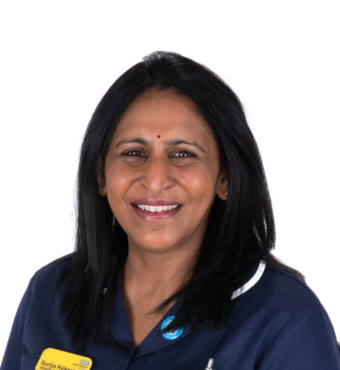
Suriya Kirkpatrick is a Band 7 Senior Cancer Research Nurse at NBT. Here, she shares her story of becoming a nurse in South Africa and contributing to improvements in patient care through her research:
Could you tell us about your career journey and educational background?
Following secondary school in Pitermaritzburg, Kwazulu Natal, South Africa (SA) I undertook a Diploma in Nursing in Midwifery – graduated in December 1996. During my nurse training, I developed an interest in psychology, and as such I went on to complete a BA (Hons) in Psychology through the University of South Africa – I graduated in 2004. As a registered nurse working in a clinical setting with several extended skills, I was supported to undertake a MSc in Advanced Practice at the University of the West of England- graduated 2012. I subsequently undertook various masters-level courses to address gaps in my knowledge and I am currently in the second year of my PhD which is supported by an OxInAHR (Oxford Institute of Applied Health Research) fellowship.
I worked as a registered nurse in SA for 2 years before I immigrated to the UK –in January 1999. I have worked at Southmead Hospital ever since. Initially as a registered nurse/junior sister in the medical directorate and as a clinical research nurse since 2008. Over the years I took up part-time secondment opportunities and gained experience as an assistant psychologist, acute oncology nurse, genomics practitioner, research associate, and principal investigator on a variety of research studies. Today I’m actively working towards establishing my career as a clinical academic. I sit on various advisory boards, I am an active member of different professional networks, I work closely with several charities, and am gradually increasing my publication record.
What made you choose the area you work in now?
I love caring for people, I have an inquiring mind and always pay attention to detail. Working as a research nurse enables me to do the things I enjoy and contribute to the development of new evidence which will ultimately improve patient care. The role also offers a degree of flexibility which enabled me to play an active role in bringing up my two children who are now 17 and 19 years old.
What qualities are essential in your position?
Good communication skills (written and verbal), organisational skills, excellent attention to detail, and a desire to want to constantly learn and keep updated.
What obstacles have you faced and overcome?
My main obstacle is career progression. I aspire to be a clinical academic, undertake research for patient benefit, and lead locally in nursing research. I’ve not quite overcome this. I hope that completing my doctoral studies and undertaking relevant leadership training will help me secure a more senior role.
What role, if any, do you think that race has played in your career progression?
I am unsure if race has impacted my career progression. I have explored more senior roles but have remained in my current role for over 15 years.
Did you have a mentor or role model?
No, I am actively seeking one.
Do you have any tips for interviews and career progression?
Prepare adequately; look at interview questions, review your application details, meet the potential employer in advance of the interview, and ask the interviewer to clarify the question if you are unclear.
Olajumoke's story
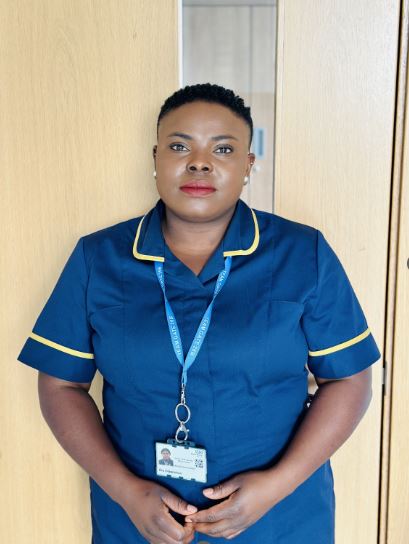
Olajumoke Olagookun is a Band 7 Senior Chief Nursing Officer Fellow, on secondment with the Chief Nursing Officer’s team. Here, she shares her story of transitioning from a marketing career into nursing and of proactively driving her own learning and development:
Could you tell us about your career journey and educational background?
After my secondary education, I trained for 5 years in a College of Education. I studied English / Education. I taught in secondary school for 2 years before moving to other fields. I joined a company as a marketing executive, and after a year, I decided to go back to university to study Business Administration. Along the line, I joined another company as a brand executive. I was in my third year of university when I came over to the UK. I arrived in December 2009, but I was unable to work until November 2010 due to personal circumstances.
In the UK I started as a domestic in what was then Frenchay Hospital. I moved into a healthcare assistant/support worker role after 3 months and worked in various settings including mental health, learning disability, supported living, nursing homes, and community. I later worked as a team leader in a supported living setting. I started my nursing degree in 2017 and I completed this programme in January 2021. I started practicing as a nurse in March 2021. I was promoted to a Band 6 Sister after twenty-two months on Ward 26b. In September 2023, I was appointed as a Senior Chief Nursing Officer Fellow which is a Band 7 role, and I am really excited for the opportunity to do this role.
What made you choose the area you work in now?
I did my management placement on Ward 26B, and I decided to stay on after a discussion with the manager at the time. I stayed on and I have no regret whatsoever.
What qualities are essential in your position?
Quality care, Effective communication, commitment, working well with others, managing conflict, confidence with autonomy, and quick decision-making.
What obstacles have you faced and overcome?
Colleagues' knowledge of who you are and when you qualified. This is a major challenge as some do not think you deserve to be where you are by their own calculation. I am self-aware of their disposition towards me. I handled this by focusing on my targets and achieving them, thereby gaining their trust.
What role, if any, do you think that race has played in your career progression?
Race has not played any part in my progression. I have had accelerated promotion and I am confident this has to do with my skills and ability. In the past, I have had some negative experiences as a result of my race, but I have not allowed this to negatively impact me. I have used those experiences to encourage me to do better in my role wherever possible
Did you have a mentor or role model?
I do not have any, but I have come across wonderful people who have helped to shape my thinking and encourage me in my career. Anne Langford is one of the Directors of Nursing who has played a key role in my career in encouraging me to aspire to do well and apply for roles that I would not have thought of personally.
Do you have any tips for interviews and career progression?
One of the benefits of working in NHS is quality training. Book yourself into training, there are loads of leadership and management training courses on LEARN. Make use of the opportunity. Take responsibility- put yourself forward. Help your team to grow and improve.
Purge yourself of the ‘mantra‘- “the interviewers have a candidate already”. Read up, watch YouTube videos, be diligent, and do the job as if it is your business and you will go far and higher.
Finally, apply for that job. Keep going, there is nothing stopping you from achieving your dreams. I wish everyone good luck in all their endeavours!
Pratikshya's story

Pratikshya Paudel is a Band 6 ICU sister and Internationally Educated Nurse at NBT. Here, she shares her story of studying nursing in Nepal and the fulfillment she gets from helping critically ill patients return to everyday life:
Could you tell us about your career journey and educational background?
I was qualified in Nepal in 2013, then started working in operating theatres as a scrub Nurse before coming to the UK for further studies in 2015. I completed my BSc hons nursing top-up degree and started working on the wards(gastro, cardio, and endocrine) before joining the ICU here in NBT in 2019. Recently I have completed an MSc level ICU course.
What made you choose the area you work in now?
I always enjoyed the thrill of working in fast fast-paced environments. It feels rewarding and fulfilling to watch a critically ill patient that you cared for go from fighting for their life to returning to their family and normal activities.
What qualities are essential in your position?
Abilities to provide compassionate care to critically ill patients and support family members while working with a multidisciplinary team are important qualities required to be an ICU nurse. Dealing with life and death can become a part of your everyday job so it's also important to become sensitive at the same time emotionally strong. The ability to keep yourself updated with current knowledge; practices and higher education is important to provide the evidence-based care that all patients deserve.
What obstacles have you faced and overcome?
I was already a senior nurse on the ward before starting in ICU, but the initial ICU journey felt like being a student again as I had to learn a complete set of new skills and knowledge in a completely different environment which was quite uncomfortable in the beginning, however, I was open to new experience and challenges and took it as a learning curve. Time passed by and did not take me long to be an ICU-competent nurse and start enjoying the work.
What role, if any, do you think that race has played in your career progression?
When I started in ICU, there were hardly any Asian nurses, so I felt a little uncomfortable. There were times I felt the cultural shock, alone and isolated. However, our team is growing and getting more diverse now. The team also made me feel welcome, included and I started to find a way to connect with the team. Having a mindset of not feeling self as an outsider tremendously helped me both personally and professionally
Did you have a mentor or role model?
Every individual has some special quality that I find fascinating and inspiring
Do you have any tips for interviews and career progression?
I think finding the right role of your interest and working toward fulfilling the necessary criteria for that role is the first important step for career progression. Good preparation, and being calm, composed, and confident are all very important skills for interviews. Consulting seniors also helps a lot.
Sani's story
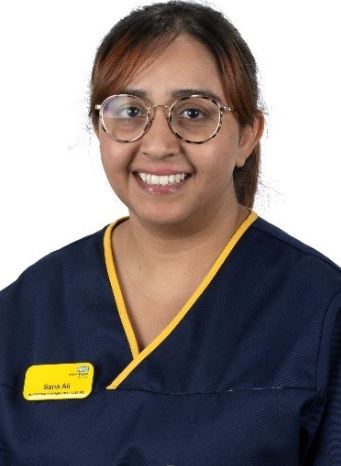
Sani Ali is a Band 6 Spine Nurse Practitioner at NBT. Here, she shares her story of working as a nurse in different countries and thriving in challenging work environments:
Could you tell us about your career journey and educational background?
I have the following qualifications:
- Diploma in Nursing in 2010 from Aga Khan University Hospital, (Karachi Pakistan)
- Post Basic Diploma in Cardiac Nursing in 2012 from Tabba Heart Institute (Karachi, Pakistan)
- Post-RN Bachelors of Science in Nursing in 2014 from Aga Khan University Hospital, (Karachi, Pakistan)
- Postgraduate in Critical Care (master's level) in 2023 from the University of the West of England, (Bristol, UK)
I have 13 years of experience in a variety of areas. I started my career as a Registered Nurse in the Neuromedical and Surgical department in Pakistan and then progressed to become a Cardiac - ICU Nurse and then a Clinical Educator. I worked as a nurse educator in Dubai, and this gave me the opportunity to work with different ethical backgrounds provide care, and work with diverse populations.
I started my NBT journey in the ICU. My clinical experiences have allowed me to develop the necessary skills to provide exceptional nursing care through a continuously evolving education. In March 2023 I was appointed as a Band 6 Spine Nurse Practitioner.
What made you choose the area you work in now?
Since I started my career, I have always worked with neurosurgical patients, I did a bit in Cardiac Nursing as well, but I think I enjoyed neurosurgery most as every day is challenging when you work with neurosurgical patients, and I love to work in challenging environment. Most importantly every single action makes a huge difference in patients' care and recovery. Patients with spinal injuries require a lot of support and guidance for their illness as well as rehabilitation needs and with my knowledge and experience, I feel like I can provide safe care.
What qualities are essential in your position?
In any position, I believe compassion is the most important quality. As healthcare providers, whenever we meet our patients, they are sick, in pain, and even dying. It is essential to be concerned about their potential suffering and let them know that we care and want to support them. Along with compassion for a successful advanced practitioner, I think these are the 4 major qualities:
- Communication
- Leadership
- Problem-solving
- Critical thinking
What obstacles have you faced and overcome?
I think a lack of confidence was my initial obstacle as I am a bit of an introvert but those who know me very well, know I am a very lively and helpful person. To overcome this, I have learned and gained skills and knowledge to successfully achieve my dreams and fulfill my responsibilities. I believe whenever I leave my comfort zone, I am able to beat all the obstacles.
What role, if any, do you think that race has played in your career progression?
I don't think race has played much role in my career progression. I believe every person, regardless of their ethnicity or background, should be able to fulfill their potential at work.
Did you have a mentor or role model?
I see all the senior management (red scrubs) as my role models because one day I would like to be one of them.
Do you have any tips for interviews and career progression?
The best tip I can say is to believe in yourself and know yourself, your strengths, and areas of improvement. It is also important to have your own road map, think about what you want to achieve or where you want to be, and start working towards your goal. We all face failures in our lives, but never get disappointed, learn from your mistakes and one day you will be successful.
Sheela's story
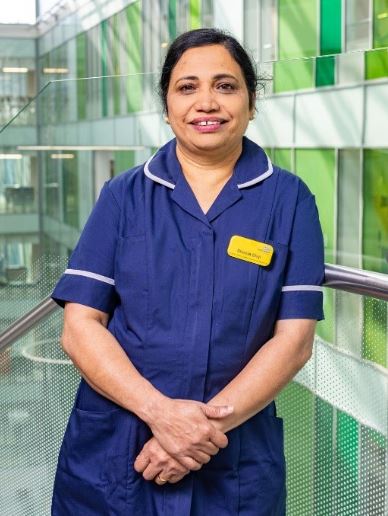
Sheela Shiji is a Band 7 Team Leader and Clinical Co-Ordinator at NBT. Here, she shares her story of developing her skills across multiple areas, and the importance of supportive managers:
Could you tell us about your career journey and educational background?
I completed my diploma in General Nursing and Midwifery in 1991. I started working in India for 2 years and then moved on to complete 9 years in the Middle East (Oman), this is where I started my career as a theatre nurse. I joined the NBT back in February 2003 starting as a Band D staff nurse within Gynae theatres at Southmead Hospital. Two years later I was promoted to the E grade. Afterwards, I moved to the main theatres, and I have worked in all sorts of specialties. Following this, in 2010 I completed my theory and practical theatre course and also completed a First Assistant course in 2016. I have been working as a Band 6 within the general, gynae, and urology cluster since 2014. I’m very glad that I have been able to contribute my skills and knowledge during the transition period from the old hospital to the new modern Brunel theatres. Since then, I have been promoted to Band 7 in April 2021.
What made you choose the area you work in now?
I love working in theatres and ensuring I deliver high standards of patient care.
What qualities are essential in your position?
Many different qualities are necessary in my position. Leadership and communication skills are vital, and equally as important is helping develop myself and others in the team. Strong decision-making and problem-solving are essential, while also building a good rapport with the team
What obstacles have you faced and overcome?
One obstacle I faced was the hardship in obtaining my Band 6 position, at that time there were not many opportunities available, so it felt very difficult to reach at that time.
What role, if any, do you think that race has played in your career progression?
I personally don’t believe race has played any position in my career progression.
Did you have a mentor or role model?
Yes, my previous manager Heather Jones helped me uplift my skills and helped shape me into the person I am today.
Do you have any tips for interviews and career progression?
Make sure to do prior research and preparation, listen to all of the questions thoroughly, and most importantly – answer with confidence.
Nida's story
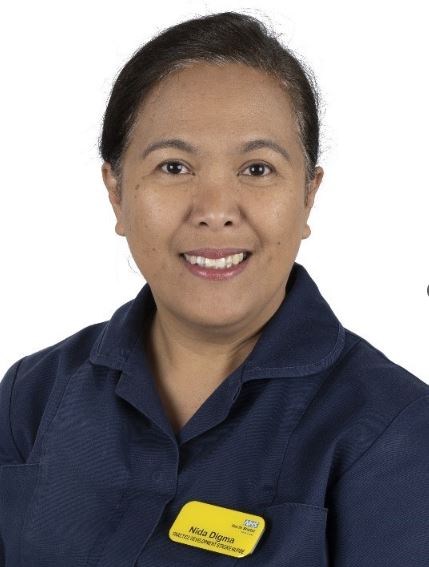
Nida Digma is a Stroke Practice Development Nurse at NBT. Here, she shares her story of studying nursing in the Philippines, and sharing her wealth of knowledge with colleagues to help them develop their own skills:
Could you tell us about your career journey and educational background?
I graduated Bachelor of Science in Nursing in the Philippines. Came to the UK in 2006 and worked for a nursing home for more than 5 years. I joined NBT in 2012 and worked in stroke rehab then moved to the acute team after about 2 years. After over 10 years of working in a stroke team, I became a Practice Development Nurse in Stroke and Neurology.
What made you choose the area you work in now?
I am able to utilise my knowledge and experience to support the team to develop their confidence clinically and learn specific skills required of their role to provide high-quality care to our patients
What qualities are essential in your position?
Being knowledgeable, patient, approachable, and organised.
What obstacles have you faced and overcome?
Staffing issues were a big challenge but I was able to deliver the training and education by promoting the importance of learning to the team and organising them in a manner that it will not interfere with the ward staffing and doing it when the ward is not very busy
What role, if any, do you think that race has played in your career progression?
In my case, I don't believe race has played a role.
Did you have a mentor or role model?
I have learnt a lot from different people I have worked with those who have different positive attitudes toward work.
Do you have any tips for interviews and career progression?
Just love your current job, work hard, and learn as much as you can which is essential in the next stage of your career.
Mary's story
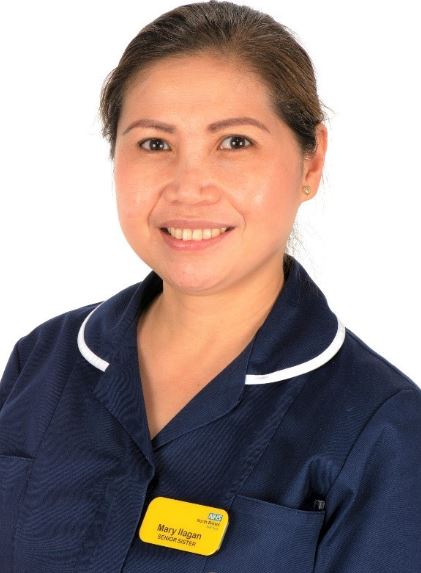
Mary Ilagan is a Band 7 Senior Sister and Internationally Educated Nurse at NBT. Here, she shares her story of her progression from a Band 4 to a Band 7 role, and the role of effective communication in patient care:
Could you tell us about your career journey and educational background?
I completed my Nursing degree in the Philippines, and I am one of the international nurses supported by the Trust in a nursing role. From the Philippines, I moved to the UK in 2003, and started my journey in a nursing role. I was fully supported by the Trust.
My career journey has been a great and challenging one spanning over 20 years now, all within NBT. As we all know these challenges are inevitable however if we have career ambitions, plans, and determinations, we can overcome many challenges. I started in Band 4, progressed to a Band 5 role then into Band 6, and I am currently in a Band 7 role as a senior sister in Gate 34a.
I would not have been able to achieve this without the support of people around me -my family, friends, all my colleagues, and other members of the whole multidisciplinary team. There are also many initiatives provided by the Trust that we can access to support us in our future development.
What made you choose the area you work in now?
I have always been passionate about caring for others, and the area I work in provides direct and indirect patient care. I have a vision of treating our patients as family, to always deliver care in an effective way at a high standard. I have always felt valued and supported by the team.
What qualities are essential in your position?
One of the most important skills that I developed when I first arrived in the UK was learning effective communication, both verbal and written. This is key learning that we as international nurses must have to successfully and effectively deliver effective care to our patients. I developed interpersonal skills and have easily adapted myself to new environments and different situations. In addition to this, my background knowledge, clinical skills, and experience that I gained from my previous workplace have helped.
It is essential in my position to lead by example, to be a good mentor, to quickly respond, and to create open communications within the team, as this creates positive outcomes, create motivation to build a strong team.
What obstacles have you faced and overcome?
A big obstacle was the wide scope of the role as a new ward manager ensuring that the team was receiving enough support in all aspects, however after building a good interpersonal relationship with the team and open communications, this inspired me to see how my staff have developed professionally and personally within their roles.
What role, if any, do you think that race has played in your career progression?
I felt that my race has affected me a little because my lack of English fluency affected my confidence earlier in my career, but now I have developed and improved this.
Did you have a mentor or role model?
Yes - I did have a role model who was an E Grade RN equivalent Band 6 nurse when I first started.
Do you have any tips for interviews and career progression?
Yes, we have to create our individual career pathways, with objectives and plans to find ways to achieve the level we are aspiring to. Ensuring you are fully prepared for any interviews is also key.
